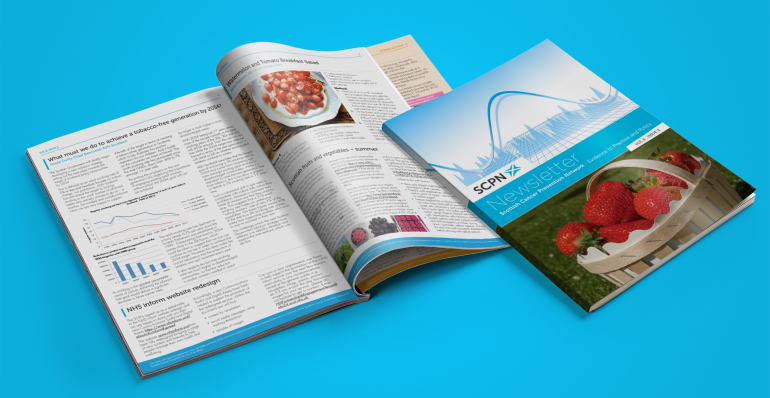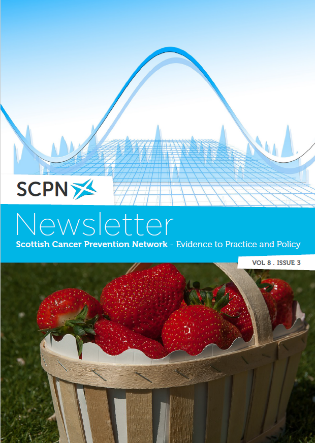
Editorial: Volume 8, Issue 3

27 Jul 17 |
Inside this issue
Achieving a tobacco-free generation by 2034 and improving the reach of Scotland’s cancer screening programmes are among the topics covered in Volume 8, Issue 3. In the science section we have the CUP report on Diet, Nutrition, Physical Activity and Breast Cancer from World Cancer Research Fund, cancer incidence in Scotland and the latest cancer and lifestyle research roundup. We also have a recipe for watermelon and tomato breakfast salad to break things up!
Editorial
In this issue of the newsletter Nuala Healy describes a Scottish Government initiative to reduce inequalities in cancer screening by increasing uptake in the more deprived areas of our society. This is clearly a worthy aim, and it is of great relevance that the new (FIT) test that is being introduced into the Scottish Bowel Screening Programme has a disproportionately greater effect on uptake among the more deprived members of the population. However, we must not lose sight of the importance of offering people informed choice when inviting them to participate in any health screening.
All screening has the potential to cause harm and when delivering a population screening programme it is essential to have robust evidence that benefit outweighs harm. The lack of such evidence, and, indeed evidence that harm outweighs benefit are the reasons why the UK National Screening Programme (UK NSC) does not yet recommend screening for two of the major cancer killers – lung cancer and prostate cancer. Unregulated screening still goes on for these conditions, but for prostate cancer at least, guidance for GPs and patients on the implications and the significant risk of harm of using PSA testing have been developed and are widely available as part of the Prostate Cancer Risk Management Programme.
Even within existing evidence based screening programmes, it is very important to ensure that the people who are invited are told about the cons as well as the pros. To this end, the UK NSC commissioned a Task and Finish Group to develop guidance for the development, production and review of information to support UK population screening programmes. This guidance will be available soon and stresses that information should be:
- Based on evidence
- Completely transparent
- Easily understood at all levels of our society
- Thoroughly tested before it is introduced
Thus, although reducing the inequality of uptake created by deprivation is something we should be striving for, we must not forget that for some people, and especially those living in conditions of extreme deprivation, participating in screening may not be a priority given the competing demands of daily life. It follows that equalising screening uptake across all levels of deprivation is a huge challenge and may not be wholly achievable.
What is important is that everyone has the opportunity to engage in evidence-based screening and that the information provided allows them to make a rational decision that suits their own circumstances.
This article was originally published in The SCPN Newsletter Volume 8, Issue 3. Read the digital newsletter below using Issuu, or feel free to download the PDF.
View the PDF
The SCPN Newsletter: Volume 8, Issue 3
In this issue: Achieving a tobacco-free generation by 2034 and improving the reach of Scotland’s cancer screening programmes are among the topics covered in Volume 8, Issue 3. In the science section we have the CUP report on Diet, Nutrition, Physical Activity and Breast Cancer from World Cancer Research Fund, cancer incidence in Scotland and the latest cancer and lifestyle research roundup. We also have a recipe for watermelon and tomato breakfast salad to break things up!